|
|

|
--: Biography of BBC NEWS :--
|
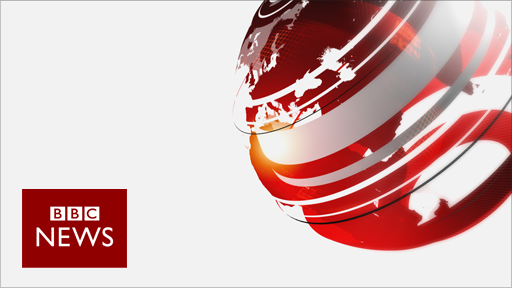
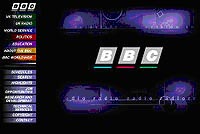 BBC website as it appeared in 1997
The BBC Director General John Birt sought government approval to direct licence fee revenue into the service, describing planned BBC internet services as the “third medium” joining the BBC's existing TV and Radio networks, achieving a change in the BBC Charter. This led to the official launch of BBC Online at the www.bbc.co.uk address in December 1997.
For a time, www.bbc.co.uk was used for the organisation's corporate and educational site, while entertainment-based content appeared on www.beeb.com. The two sites were merged in 1998 to become BBC Online, at www.bbc.co.uk. By December 1998, the BBC Homepage was being described as "your gateway to 200 sites and 25,000 pages"
In 1999, the BBC bought the www.bbc.com domain name for $375,000, previously owned by Boston Business Computing, but the price of this purchase was not revealed until 6 years later. As of 2005, www.bbcnc.org.uk no longer exists. The beeb.com address now redirects to the BBC Shop website run by BBC Worldwide, at www.bbcshop.com.
BBC Online (located at the URL bbc.co.uk) is the brand name and home for the BBC's UK online service. It is a large network of websites including such high profile sites as BBC News and Sport, the on-demand video and radio services co-branded BBC iPlayer, the pre-school site Cbeebies, and learning services such as Bitesize. The BBC has had an online presence supporting its TV and radio programmes and web-only initiatives since 1994 but didn't launch officially until December 1997, following government approval to fund it by TV licence fee revenue as a service in its own right. Throughout its short history, the online plans of the BBC have been subject to various public consultations and government reviews illustrating concerns from commercial rivals that its large presence and public funding distorts the UK market.
The website has gone through several branding changes since it was launched. Originally named BBC Online, it was then rebranded as BBCi (which itself was the brand name for interactive TV services) before being named bbc.co.uk. It was then branded BBC Online again in 2008. The Web-based service of the BBC is one of the world's largest and most visited websites (forty-fifth most visited according to Alexa on 1 September 2010). As of 2007, it contained over two million pages.
On 26 February 2010 The Times claimed that Mark Thompson, Director General of the BBC, proposed that the BBC's web output should be cut by 50%, with online staff numbers and budgets reduced by 25% in a bid to scale back BBC operations and allow commercial rivals more room.[4] On 2 March 2010, the BBC reported that it will cut its website spending by 25% and close BBC 6 Music and Asian Network.[5][6]
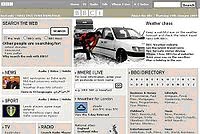
BBC website navbar, 2004
In 2001 BBC Online was rebranded as BBCi. The BBCi name was conceived as an umbrella brand for all the BBC's digital interactive services across web, digital teletext, interactive TV and on mobile plaftorms. The use of letter "i" prefixes and suffixes to denote information technology or interactivity was very much in vogue at this time, according to the BBC, the "i" in BBCi stood for "interactivity" as well as "innovation".
As part of the rebrand, BBC website pages all displayed a standard navigation bar across the top of the screen, offering a category-based navigation: Categories, TV, Radio, Communicate, Where I Live, A-Z Index and a search. The navbar was designed to offer a similar navigation system to the i-bar on BBCi interactive television.
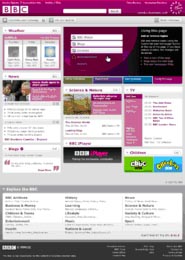
The BBC homepage on March 2010.
After three years of consistent use across different platforms, the BBC began to drop the BBCi brand gradually; on 6 May 2004, the BBC website was renamed bbc.co.uk, after the main URL used to access the site. Interactive TV services continued under the BBCi brand until it was dropped completely in 2008. The BBC's online video player, the iPlayer has, however, retained an i-prefix in its branding.
On 14 December 2007, a beta version of a new bbc.co.uk homepage was launched, with the ability to customise the page by adding, removing and rearranging different categories, such as 'News', 'Weather' and 'Entertainment'. The widget-based design was inspired by sites such as Facebook and iGoogle. The new homepage also had a simple searchbox taskbar with BBC clock from the 1970s as well as a box containing featured content of the website. The new BBC homepage left beta stage on Wednesday, 27 February 2008 to serve as the new BBC Homepage under the same URL as the previous version did.
On the 30 January 2010, the current homepage was available as a beta version, and by May 2010 the homepage was replaced by the newer one. This new homepage expanded on the modules idea and the customisation theme. The website allowed certain themes that interested the viewer to be tracked, via a new module. It also included a new 'Media Zone' where featured content could be displayed. The taskbar was again changed to include the headings: Home, News, Sport, Weather, iPlayer, TV, Radio and more. This new taskbar was included across the entire website, however since the launch of the new BBC news website, the taskbar may be changed once again. Despite the cosmetic appearance of the relaunch, the new website was actually relaunched using a completely different operating system.
The websites include news from the BBC News Online, a sports section, music, science, technology and entertainment pages, amongst other things. As might be expected, the website has a British orientation, although the home page, news section and sports section each provide different content between UK and "International" visitors.
In February 2001, BBC Online incorporated Douglas Adams' previously independent h2g2 project into its group of web sites, and is now replacing all its existing message boards with the DNA software derived from that project. The site's Collective magazine also uses the DNA software.
The website has extensive technical information available about its operation. The BBC also makes some of the content on bbc.co.uk and the BBC News Website available in XML format on its developer network backstage.bbc.co.uk. Also, through participation in the Creative Archive Licence group, bbc.co.uk allows legal downloads of selected material via the Internet.
The BBC runs a comprehensive children's website subsite. It includes information on all of CBBC's shows along with several subsites covering art, sport, news, and other current events. Its message boards are especially popular with children who use them to communicate with each other about all of CBBC's output among other salient topics for kids like bullying, books, and personal problems. The "Your Life" [20] page was especially geared to helping young people sort through their difficulties. 'Your Life' was subsequently closed though a professional psychotherapist agony uncle called "Ask Aaron" still provides answers to questions online and on interactive television through CBBC eXtra.
The BBC also runs a message board for young people named onion street.
There is integration between television output and website content with aspects of children's programming have followup information on their websites.
BBC Blast is the BBC's network for creative teenagers. It provides access to mentors both online and at free events and workshops across the UK. The website specifically caters for 13 to 19 year olds butthe BBC Blast project also runs a variety of work experience schemes for young adults between the ages of 18 to 25 Blast has been running since 2002. It includes a forum where participants can upload videos, audio tracks and images and comment on each others work. In the past the BBC Blast tour has featured workshops and talks with stars from a variety of backgrounds, including rapper Akala, director and actor Noel Clarke, 1Xtra DJs Ace and Vis, singer-songwriter Jay Sean, rapper Chipmunk and Panjabi Hit Squad.
Blast works with a number of partners to put on events and give content a chance to be promoted at a higher level. These partners include the Victoria and Albert Museum, RSC,National Portrait Gallery, National Theatre, Zoo Nation, and the British Film Institute.
BBC Programmes is a service of BBC Online which provides a page for every television and radio programme broadcast by the BBC in the United Kingdom. It was launched in October 2007 and gives each programme a eight digit alphanumeric identifier which is used to provide a permanent URL.[21][22] It currently only holds data from the launch date, but Jana Bennett, Director of BBC Vision, said in June 2008 that the BBC will eventually add a page for each programme it has broadcast over its history to the service.
The BBC Programme Catalogue is an internal archive of the BBC back catalogue which was briefly available online to the public in beta.
The BBC's site was initially entirely free from advertising, this was due to the BBC's funding, derived primarily from compulsory television licence fees from UK viewers. BBC Worldwide who exploit BBC brands commercially have had several attempts at launching services online including Beeb.com in the late 1990s.
In 2006, the BBC began making controversial plans to raise revenue by including advertising on the international version of BBC News Online accessed from outside the United Kingdom. BBC Online is currently freely available worldwide (via various URLs including bbc.com/news) but planned video services and a lower than expected licence fee settlement paid for by UK residents only led to the BBC introducing banner advertisements to the site from November 2007. The BBC Trust approved the plans for introducing advertisements which also involved creating bbc.com as a part of BBC Worldwide. Sir Michael Lyons, Chairman of the Trust, confirmed the BBC would not charge for online news following News Internationals planned introduction of charges for online content.
From 1999 to 2005, the BBC ran a popular subsite called Cult TV. This subsite had news, star interviews, trivia, and other content popular with fans of the cult TV shows they covered. Examples of covered TV shows include The X-Files, Doctor Who, Buffy the Vampire Slayer, Farscape and The Hitchhiker's Guide to the Galaxy.
On 15 July 2005, the BBC announced that the site was closing as of the end of the month, although the Doctor Who section would be unaffected as the series was an ongoing BBC concern. The announcement explained that this was "part of the restructuring of the BBC's online activities". It was promised that some of the content would be moved to new places on bbc.co.uk, although as of March 2008 it is currently still all online at the no-longer-updated Cult site.
The BBC is a corporation, independent from direct government intervention, with its activities being overseen by the BBC Trust (formerly the Board of Governors).
General management of the organisation is in the hands of a Director-General, who is appointed by the Trust; he is the BBC's Editor-in-Chief and chairs the Executive Board.
The current Charter came into effect on 1 January 2007 and runs until 31 December 2016. The Royal Charter is reviewed every 10 years.
The 2007 Charter specifies that the mission of the Corporation is to "inform, educate and entertain". It states that the Corporation exists to serve the public interest and to promote its public purposes:
- Sustaining citizenship and civil society;
- Promoting education and learning;
- Stimulating creativity and cultural excellence;
- Representing the UK, its nations, regions and communities;
- Bringing the UK to the world and the world to the UK;
- Helping to deliver to the public the benefit of emerging communications technologies and services, and taking a leading role in the switchover to digital television.
This Charter also created the largest change in the governance of the Corporation since its inception. It abolished the sometimes controversial governing body, the Board of Governors, and replaced it with the BBC Trust and a formalised Executive Board.
The BBC Trust was formed on 1 January 2007, replacing the Board of Governors as the governing body of the Corporation. The Trust sets the strategy for the corporation, assesses the performance of the BBC Executive Board in delivering the BBC's services, and appoints the Director-General.
BBC Trustees are appointed by the British monarch on advice of government ministers. The current members of the Trust are:
- Sir Michael Lyons (Chairman)
- Chitra Bharucha (Vice-Chairman)
- Diane Coyle
- Anthony Fry
- Alison Hastings
- Dame Patricia Hodgson
- Rotha Johnston
- Janet Lewis-Jones
- David Liddiment
- Jeremy Peat
- Mehmuda Mian
- Richard Tait
- Connor Woodley
- Jacob Dunne
The Executive Board is responsible for operational management and delivery of services within a framework set by the BBC Trust, and is headed by the Director-General, Mark Thompson. The Executive Board consists of both executive and non-executive directors. Executive directors:
- Mark Thompson (Executive Board Chairman; Director-General; and the BBC's Editor-in-Chief)
- Mark Byford (Deputy Director-General; Director, Journalism Group)
- Jana Bennett OBE (Director, BBC Vision)
- Tim Davie (Director, BBC Audio & Music)
- Erik Huggers (Director, Future Media & Technology)
- Lucy Adams (Director, BBC People)
- Zarin Patel (Chief Financial Officer)
- Caroline Thomson (Chief Operating Officer)
- Sharon Baylay (Director, Marketing, Communications & Audiences)
Non-executive directors:
- Marcus Agius (senior non-executive director), Chairman, Barclays
- Robert Webb QC, (also chairman, BBC Worldwide Ltd) former General Counsel, British Airways
- Dr Mike Lynch OBE, co-founder and Chief Executive, Autonomy Corporation
- David Robbie, Group Finance Director, Rexam
- Dr Samir Shah OBE, Chief Executive, Juniper Communications
- Val Gooding former Chief Executive of BUPA
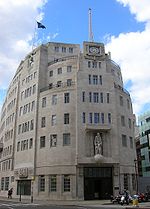
Headquarters and regional offices
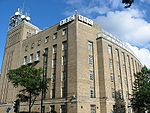
The headquarters of the BBC at Broadcasting House in Portland Place, London.
The headquarters of BBC Northern Ireland at Broadcasting House on Ormeau Avenue, Belfast, Northern Ireland.
Further information: Broadcasting House, Broadcasting House (Belfast), Broadcasting House (Cardiff), BBC Television Centre
Broadcasting House in Portland Place, London, is the official headquarters of the BBC. It is home to three of the ten BBC national radio networks (of which five are currently digital only services not carried on conventional 'analogue' radio). They are BBC Radio 3, BBC Radio 4, and BBC 7. On the front of the building are statues of Prospero and Ariel, characters from William Shakespeare's play The Tempest, sculpted by Eric Gill.
Renovation of Broadcasting House began in 2002 and is scheduled for completion in 2012. As part of a major reorganisation of BBC property, the entire BBC News operation is expected to relocate from the News Centre at BBC Television Centre to the refurbished Broadcasting House to create what is being described as "one of the world's largest live broadcast centres" Following completion Broadcasting House will also be home to most of the BBC's national radio stations, and the BBC World Service. The major part of this plan involves the demolition of the two post-war extensions to the building and construction of an extension designed by Sir Richard MacCormac.
By far the largest concentration of BBC staff in the UK exists in White City and Shepherd's Bush in West London, although many of these will move by 2011 to the purpose-built MediaCityUK in Salford, Greater Manchester. Well-known buildings in the White City and Shepherd's Bush area include BBC Television Centre and the White City complex, which includes the Media Centre, Broadcast Centre and Centre House. BBC News is currently based at White City, but much of it is due to return to Broadcasting House, along with the World Service, on completion of the redevelopment there.
As well as the two main sites in London (Broadcasting House and White City), there are six other major BBC production centres in the UK:
- Cardiff (Broadcasting House Cardiff)
- Belfast (Broadcasting House Belfast)
- Glasgow (BBC Pacific Quay)
- Birmingham (The Mailbox)
- Manchester (currently based in Oxford Road, Manchester but moving to MediaCityUK by 2011)
- Bristol, which is home to the world-famous BBC Natural History Unit.
There are also many smaller local and regional studios scattered throughout the UK.
In 2011, the BBC is planning to move several departments including BBC Sport and BBC Children's, as well as BBC Radio 5 Live north to newly built premises in Salford Quays, Greater Manchester. This will mark a major decentralisation of the Corporation's operations from London.

The back of the BBC Birmingham headquarters in The Mailbox.
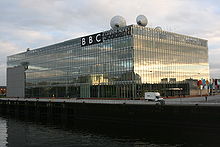
BBC Scotland's and BBC Alba's HQ in Glasgow.
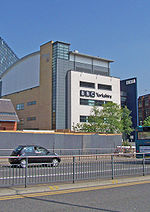
BBC Yorkshire headquarters in Leeds.
In the UK, BBC One and BBC Two are the BBC's flagship television channels. Several digital only stations are also broadcast: BBC Three, BBC Four, BBC News, BBC Parliament, and two children's channels, CBBC and CBeebies. Digital television is now in widespread use in the UK, with analogue transmission being phased out by December 2012.
BBC One is a regionalised TV service which provides opt-outs throughout the day for local news and other local programming. These variations are more pronounced in the BBC 'Nations', i.e. Northern Ireland, Scotland and Wales, where the presentation is mostly carried out locally on BBC One and Two. BBC Two variations within England are currently rare, though most regions still have the ability to 'opt out' of the main feed, albeit on analogue only. BBC Two was also the first channel to be transmitted on 625 lines in 1964, then carry a small-scale regular colour service from 1967. BBC One would follow in November 1969.
A new Scottish Gaelic television channel, BBC Alba, was launched in September 2008. It is also the first multi-genre channel to come entirely from Scotland with almost all of its programmes made in Scotland. The service is currently[when?] only available via satellite and cable television.
In the Republic of Ireland, Switzerland and the Netherlands, the BBC channels are available in a number of ways. In these countries digital and cable operators carry a range of BBC channels these include BBC One, BBC Two and BBC World News, although viewers in the Republic of Ireland may receive BBC services via 'overspill' from transmitters in Northern Ireland or Wales, or via 'deflectors' – transmitters in the Republic which rebroadcast broadcasts from the UK, received off-air, or from digital satellite.
From 9 June 2006, the BBC began a 6–12 month trial of high-definition television broadcasts under the name BBC HD. The corporation has been producing programmes in the format for many years, and states that it hopes to produce 100% of new programmes in HDTV by 2010.
Since 1975, the BBC has also provided its TV programmes to the British Forces Broadcasting Service (BFBS), allowing members of UK military serving abroad to watch and listen to them on two dedicated TV channels.
In 2008, the BBC began experimenting with live streaming of certain channels in the UK, and in November 2008, all standard BBC television channels were made available to watch online.
The BBC has five major national stations:
- Radio 1 ("the best new music and entertainment")
- Radio 2 (the UK's most listened to radio station, with 12.9 million weekly listeners)
- Radio 3 (classical and jazz music)
- Radio 4 (current affairs, factual, drama and comedy)
- Radio 5 Live (24 hour news, sports and talk)
In recent years some further national stations have been introduced on digital radio platforms including Five Live Sports Extra (a companion to Five Live for additional events coverage), 1Xtra (for black, urban and gospel music), 6 Music (less mainstream genres of music), BBC Radio 7 (comedy, drama & children's programming) and BBC Asian Network (British South Asian talk, music and news in English and in many South Asian languages), a station which had evolved from BBC Local Radio origins in the 1970s and still is broadcast on Medium Wave frequencies in some parts of England. In addition the BBC World Service is now also broadcast nationally in the UK on DAB.
There is also a network of local stations with a mixture of talk, news and music in England and the Channel Islands as well as national stations (Nations' radio) of BBC Radio Wales, BBC Radio Cymru (in Welsh), BBC Radio Scotland, BBC Radio nan Gaidheal (in Scots Gaelic), BBC Radio Ulster, and BBC Radio Foyle.
The BBC also provides separate local radio services for the Channel Islands of Guernsey- BBC Guernsey and Jersey- BBC Radio Jersey, with local TV news coverage from BBC Channel Islands. These services are provided as a convenience, since strictly the Channel Islands are not part of the United Kingdom so the funding for the Guernsey and Jersey broadcasts comes largely from locally collected licence fees.
The BBC does not offer separate local services for the Isle of Man, partly because the island has long been served by the independent commercial radio station Manx Radio.
For a worldwide audience, the BBC produces the BBC World Service funded by the Foreign Office, which is broadcast worldwide on shortwave radio, and on DAB Digital Radio in the UK. The World Service is a major source of news and information programming and can be received in 150 capital cities worldwide, with a weekly audience estimate of 163 million listeners worldwide. As of 2005, the Service was broadcasting in 33 languages and dialects (including English), though not all languages are broadcast in all areas.
In 2005, the BBC announced that it would substantially reduce its radio broadcasting in Thai language (closed in 2006) and Eastern European languages and divert resources instead to a new Arabic language satellite TV broadcasting station (including radio and online content) in the Middle East to be launched in 2007.
Since 1943, the BBC has also provided radio programming to the British Forces Broadcasting Service, which broadcasts in countries where British troops are stationed.
All of the national, local, and regional BBC radio stations, as well as the BBC World Service, are available over the Internet in the RealAudio streaming format. In April 2005, the BBC began trials offering a limited number of radio programmes as podcasts.
Historically, the BBC was the only (legal) radio broadcaster based in the UK mainland until 1967, when University Radio York (URY), then under the name Radio York, was launched as the first (and now oldest) legal independent radio station in the country. However, the BBC did not enjoy a complete monopoly before this as several Continental stations (such as Radio Luxembourg) broadcast programmes in English to Britain since the 1930s and the Isle of Man based Manx Radio began in 1964.
BBC Radio 1 is carried in the United States and Canada on XM Satellite Radio and Sirius Satellite Radio.
The BBC is a patron of The Radio Academy
BBC News is the largest broadcast news gathering operation in the world, providing services to BBC domestic radio as well as television networks such as the BBC News, BBC Parliament and BBC World News, as well as BBC Red Button, Ceefax and BBC News Online. New BBC News services that are also proving popular are mobile services to mobile phones and PDAs. Desktop news alerts, e-mail alerts, and digital TV alerts are also available.
The BBC's online presence includes a comprehensive news website and archive. It was launched as BBC Online, before being renamed BBCi, then bbc.co.uk, before it was rebranded back as BBC Online. The website uses GeoIP technology and carries advertisements when viewed outside of the UK. The BBC claims the site to be "Europe's most popular content-based site" and states that 13.2 million people in the UK visit the site's more than two million pages each day. According to Alexa's TrafficRank system, in July 2008 BBC Online was the 27th most popular English Language website in the world, and the 46th most popular overall.
A new version of the BBC homepage was launched in December 2007, with the new site enabling the user to customise the BBC's internet services to their own needs. This, on 28 February 2008, was made permanent.
The website includes a page for every programme on television and radio, and it is common for viewers and listeners to be told website addresses for the website sections relating to that programme. The site also allows users to listen to most Radio output live and for seven days after broadcast using the BBC iPlayer platform, which launched on 27 July 2007, and initially used peer-to-peer and DRM technology to deliver both radio and TV content of the last seven days for offline use for up to 30 days, since then video is now streamed directly. Also, through participation in the Creative Archive Licence group, bbc.co.uk allowed legal downloads of selected archive material via the internet. As of February 2008 the BBC has also offered television programmes for download on Apple iTunes under the studio title "BBC Worldwide".
BBC Jam was a free online service, delivered through broadband and narrowband connections, providing high-quality interactive resources designed to stimulate learning at home and at school. Initial content was made available in January 2006 however BBC Jam was suspended on 20 March 2007 due to allegations made to the European Commission that it was damaging the interests of the commercial sector of the industry.
In recent years some major on-line companies and politicians have complained that the bbc.co.uk website receives too much funding from the television licence, meaning that other websites are unable to compete with the vast amount of advertising-free on-line content available on bbc.co.uk. Some have proposed that the amount of licence fee money spent on bbc.co.uk should be reduced—either being replaced with funding from advertisements or subscriptions, or a reduction in the amount of content available on the siteIn response to this the BBC carried out an investigation, and has now set in motion a plan to change the way it provides its online services. bbc.co.uk will now attempt to fill in gaps in the market, and will guide users to other websites for currently existing market provision. (For example, instead of providing local events information and timetables, users will be guided to outside websites already providing that information.) Part of this plan included the BBC closing some of its websites, and rediverting money to redevelop other parts.
On 26 February 2010 The Times claimed that Mark Thompson, Director General of the BBC, proposed that the BBC's web output should be cut by 50%, with online staff numbers and budgets reduced by 25% in a bid to scale back BBC operations and allow commercial rivals more room. On 2 March 2010, the BBC reported that it will cut its website spending by 25% and close BBC 6 Music and Asian Network.
BBC Red Button is the brand name for the BBC's interactive digital television services, which are available through Freeview (digital terrestrial), as well as Freesat, Sky (satellite), and Virgin Media (cable). Unlike Ceefax, BBC Red Button is able to display full-colour graphics, photographs, and video, as well as programmes. Recent examples include the interactive sports coverage for football and rugby football matches and the 2008 Olympic Games, BBC Soundbites which starred young actress Jennifer Lynn and an interactive national IQ test, Test the Nation. All of the BBC's digital television stations, (and radio stations on Freeview), allow access to the BBC Red Button service.
As well as the 24/7 service, BBC Red Button provides viewers with over 100 interactive TV programmes every year, including news and weather[74]
BBC Worldwide Limited is the wholly owned commercial subsidiary of the BBC responsible for the commercial exploitation of BBC programmes and other properties, including a number of television stations throughout the world. The cable and satellite stations BBC Prime (in Europe, Africa, the Middle East, and Asia), BBC America, BBC Canada (alongside BBC Kids), broadcast popular BBC programmes to people outside the UK, as does UK.TV (co-run with Foxtel and Fremantle Media) in Australasia. A similar service, BBC Japan, ceased broadcasts in April 2006 after its Japanese distributor folded.
BBC Worldwide also runs a 24-hour news channel, BBC World News and co-runs, with Virgin Media, the UKTV network of stations in the UK, producers of, amongst others, G.O.L.D. and Dave. In addition, BBC television news appears nightly on many Public Broadcasting Service stations in the United States, as do reruns of BBC programmes such as EastEnders, and in New Zealand on TV One.
BBC World News, its journalism arm, has bases or correspondents in more than 200 countries and, as officially surveyed, is available to more than 274 million households, though also possibly far more individual persons and groups than surveys can gather, and it is the oldest surviving entity of its kind. The BBC's reach is significantly more than CNN's estimated 200 million.
Many BBC programmes (especially documentaries) are sold via BBC Worldwide to foreign television stations, and comedy, documentaries and historical drama productions are popular on the international DVD market.
BBC Worldwide also maintains the publishing arm of the BBC and it is the third-largest publisher of consumer magazines in the United Kingdom. BBC Magazines, formerly known as BBC Publications, publishes the Radio Times (and published the now-defunct The Listener) as well as a number of magazines that support BBC programming such as BBC Top Gear, BBC Good Food, BBC Sky at Night, BBC History, BBC Wildlife and BBC Music.
BBC Worldwide also produces several branded channels available on satellite in Asia and India, including BBC Lifestyle, BBC Knowledge and BBC Entertainment. In December 2007, a Polish version of BBC Entertainment launched in Poland.
The BBC has traditionally played a major role in producing book and music tie-ins with its broadcast material. BBC Records produced soundtrack albums, talking books and material from radio broadcasts of music.
Between 2004 and 2006, BBC Worldwide owned the independent magazine publisher Origin Publishing.
BBC Worldwide also licences and directly sells DVD and audio recordings of popular programmes to the public, most notably Doctor Who (including books and merchandise), and archive classical music recordings, initially as BBC Radio Classics and then BBC Legends.
BBC Worldwide also own the biggest travel guidebook and digital media publisher in the world, Lonely Planet.
Source Wikipedia
|
|
|
|
Total Visit of BBC NEWS : 2027
|
|
|
|
|
|